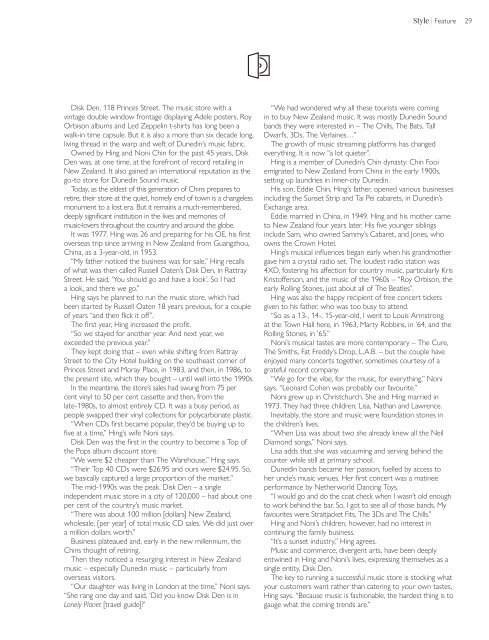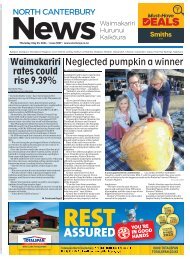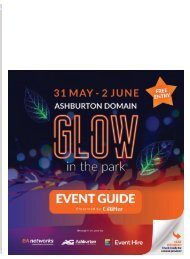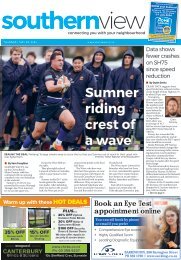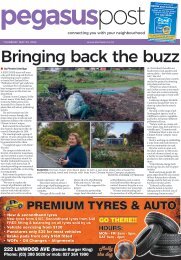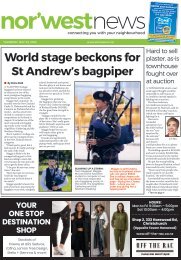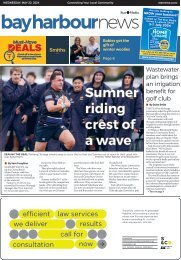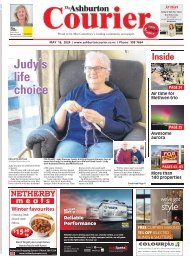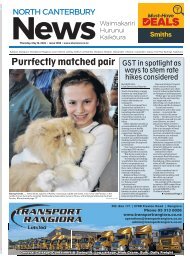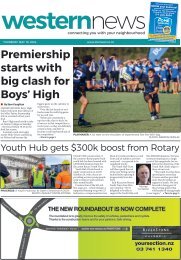Style: August 05, 2022
You also want an ePaper? Increase the reach of your titles
YUMPU automatically turns print PDFs into web optimized ePapers that Google loves.
<strong>Style</strong> | Feature 29<br />
Disk Den, 118 Princes Street. The music store with a<br />
vintage double window frontage displaying Adele posters, Roy<br />
Orbison albums and Led Zeppelin t-shirts has long been a<br />
walk-in time capsule. But it is also a more than six decade long,<br />
living thread in the warp and weft of Dunedin’s music fabric.<br />
Owned by Hing and Noni Chin for the past 45 years, Disk<br />
Den was, at one time, at the forefront of record retailing in<br />
New Zealand. It also gained an international reputation as the<br />
go-to store for Dunedin Sound music.<br />
Today, as the eldest of this generation of Chins prepares to<br />
retire, their store at the quiet, homely end of town is a changeless<br />
monument to a lost era. But it remains a much-remembered,<br />
deeply significant institution in the lives and memories of<br />
music-lovers throughout the country and around the globe.<br />
It was 1977. Hing was 26 and preparing for his OE, his first<br />
overseas trip since arriving in New Zealand from Guangzhou,<br />
China, as a 3-year-old, in 1953.<br />
‘‘My father noticed the business was for sale,’’ Hing recalls<br />
of what was then called Russell Oaten’s Disk Den, in Rattray<br />
Street. He said, ‘You should go and have a look’. So I had<br />
a look, and there we go.’’<br />
Hing says he planned to run the music store, which had<br />
been started by Russell Oaten 18 years previous, for a couple<br />
of years ‘‘and then flick it off’’.<br />
The first year, Hing increased the profit.<br />
‘‘So we stayed for another year. And next year, we<br />
exceeded the previous year.’’<br />
They kept doing that – even while shifting from Rattray<br />
Street to the City Hotel building on the southeast corner of<br />
Princes Street and Moray Place, in 1983, and then, in 1986, to<br />
the present site, which they bought – until well into the 1990s.<br />
In the meantime, the store’s sales had swung from 75 per<br />
cent vinyl to 50 per cent cassette and then, from the<br />
late-1980s, to almost entirely CD. It was a busy period, as<br />
people swapped their vinyl collections for polycarbonate plastic.<br />
‘‘When CDs first became popular, they’d be buying up to<br />
five at a time,’’ Hing’s wife Noni says.<br />
Disk Den was the first in the country to become a Top of<br />
the Pops album discount store.<br />
‘‘We were $2 cheaper than The Warehouse,’’ Hing says.<br />
‘‘Their Top 40 CDs were $26.95 and ours were $24.95. So,<br />
we basically captured a large proportion of the market.’’<br />
The mid-1990s was the peak. Disk Den – a single<br />
independent music store in a city of 120,000 – had about one<br />
per cent of the country’s music market.<br />
‘‘There was about 100 million [dollars] New Zealand,<br />
wholesale, [per year] of total music CD sales. We did just over<br />
a million dollars worth.’’<br />
Business plateaued and, early in the new millennium, the<br />
Chins thought of retiring.<br />
Then they noticed a resurging interest in New Zealand<br />
music – especially Dunedin music – particularly from<br />
overseas visitors.<br />
‘‘Our daughter was living in London at the time,’’ Noni says.<br />
‘‘She rang one day and said, ‘Did you know Disk Den is in<br />
Lonely Planet [travel guide]?’<br />
‘‘We had wondered why all these tourists were coming<br />
in to buy New Zealand music. It was mostly Dunedin Sound<br />
bands they were interested in – The Chills, The Bats, Tall<br />
Dwarfs, 3Ds, The Verlaines…’’<br />
The growth of music streaming platforms has changed<br />
everything. It is now ‘‘a lot quieter’’.<br />
Hing is a member of Dunedin’s Chin dynasty. Chin Fooi<br />
emigrated to New Zealand from China in the early 1900s,<br />
setting up laundries in inner-city Dunedin.<br />
His son, Eddie Chin, Hing’s father, opened various businesses<br />
including the Sunset Strip and Tai Pei cabarets, in Dunedin’s<br />
Exchange area.<br />
Eddie married in China, in 1949. Hing and his mother came<br />
to New Zealand four years later. His five younger siblings<br />
include Sam, who owned Sammy’s Cabaret, and Jones, who<br />
owns the Crown Hotel.<br />
Hing’s musical influences began early when his grandmother<br />
gave him a crystal radio set. The loudest radio station was<br />
4XD, fostering his affection for country music, particularly Kris<br />
Kristofferson, and the music of the 1960s – ‘‘Roy Orbison, the<br />
early Rolling Stones, just about all of The Beatles’’.<br />
Hing was also the happy recipient of free concert tickets<br />
given to his father, who was too busy to attend.<br />
‘‘So as a 13-, 14-, 15-year-old, I went to Louis Armstrong<br />
at the Town Hall here, in 1963, Marty Robbins, in ’64, and the<br />
Rolling Stones, in ’65.’’<br />
Noni’s musical tastes are more contemporary – The Cure,<br />
The Smiths, Fat Freddy’s Drop, L.A.B. – but the couple have<br />
enjoyed many concerts together, sometimes courtesy of a<br />
grateful record company.<br />
‘‘We go for the vibe, for the music, for everything,’’ Noni<br />
says. ‘‘Leonard Cohen was probably our favourite.’’<br />
Noni grew up in Christchurch. She and Hing married in<br />
1973. They had three children; Lisa, Nathan and Lawrence.<br />
Inevitably, the store and music were foundation stones in<br />
the children’s lives.<br />
‘‘When Lisa was about two she already knew all the Neil<br />
Diamond songs,’’ Noni says.<br />
Lisa adds that she was vacuuming and serving behind the<br />
counter while still at primary school.<br />
Dunedin bands became her passion, fuelled by access to<br />
her uncle’s music venues. Her first concert was a matinee<br />
performance by Netherworld Dancing Toys.<br />
‘‘I would go and do the coat check when I wasn’t old enough<br />
to work behind the bar. So, I got to see all of those bands. My<br />
favourites were Straitjacket Fits, The 3Ds and The Chills.’’<br />
Hing and Noni’s children, however, had no interest in<br />
continuing the family business.<br />
‘‘It’s a sunset industry,’’ Hing agrees.<br />
Music and commerce, divergent arts, have been deeply<br />
entwined in Hing and Noni’s lives, expressing themselves as a<br />
single entity, Disk Den.<br />
The key to running a successful music store is stocking what<br />
your customers want rather than catering to your own tastes,<br />
Hing says. ‘‘Because music is fashionable, the hardest thing is to<br />
gauge what the coming trends are.’’


